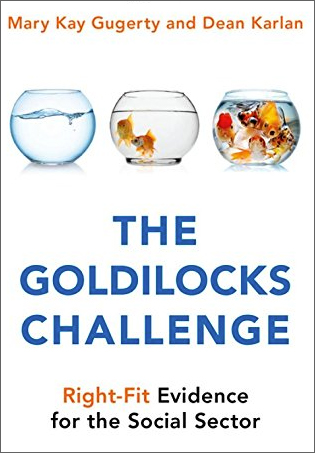Guest post by Jeff Mosenkis of Innovations for Poverty Action. First, congratulations to some fantastic economists: Amy Finkelstein on her election to the National Academy of Sciences Pam Jakiela on her appointment as a senior fellow at the Center for Global Development Seema Jayachandran on becoming an editor of AEJ: Applied Economics Jessica Goldberg on becoming Associate Prof at the University of Maryland What a great week for the field (and sorry to the many I’ve probably missed). Mary Kay Gugerty and Dean Karlan have a new book NOT on RCTs, but a practical how-to for other kinds of useful data-gathering. The Goldilocks Challenge: Right-Fit Evidence For the Social Sector focuses on four basic principles for how organizations (particularly social sector ones), can collect good M&E or
Topics:
Jeff Mosenkis (IPA) considers the following as important: book, data, development, Economics, links, M&E, miscellany, monitoring and evaluation, news, Research, research methods, statistics
This could be interesting, too:
Lars Pålsson Syll writes Schuldenbremse bye bye
Lars Pålsson Syll writes What’s wrong with economics — a primer
Lars Pålsson Syll writes Krigskeynesianismens återkomst
Lars Pålsson Syll writes Finding Eigenvalues and Eigenvectors (student stuff)
Guest post by Jeff Mosenkis of Innovations for Poverty Action.

- First, congratulations to some fantastic economists:
- Amy Finkelstein on her election to the National Academy of Sciences
- Pam Jakiela on her appointment as a senior fellow at the Center for Global Development
- Seema Jayachandran on becoming an editor of AEJ: Applied Economics
- Jessica Goldberg on becoming Associate Prof at the University of Maryland
What a great week for the field (and sorry to the many I’ve probably missed).
- Mary Kay Gugerty and Dean Karlan have a new book NOT on RCTs, but a practical how-to for other kinds of useful data-gathering. The Goldilocks Challenge: Right-Fit Evidence For the Social Sector focuses on four basic principles for how organizations (particularly social sector ones), can collect good M&E or other kinds of data to improve their work. And a whole lot of free case studies and toolkits are online.
- Job: IPA is starting a research methods initiative, doing research on research – using the hundreds of studies in progress across 21 countries to improve and explore new methods for the field. We’re looking for a director for the new initiative (Ph.D.-level)
- In some states where teacher pay is particularly low, districts are bringing in teachers from the Philippines who will work for very little (and often pay middlemen high fees for the opportunity). One Arizona official explains:
“In these times, you have to be innovative and creative in recruiting,” said Patricia Davis-Tussey, Pendergast’s head of human resources. “We embrace diversity and really gain a lot from the cultural exchange experience. Our students do as well.” (Via Alex Eble)
- GiveWell offered their take on recent discussions of the longer-term impacts of unconditional cash transfers today.
- One of the recent trends we’ve seen from some studies is the long-term effects of cash transfers on the children of the families for their development later in life. And there’s a new unconditional cash transfer RCT in the U.S. of $333 monthly to poor mothers of babies for 40 months, to see if it affects the brain and other development of those babies. (h/t Jonathan Morduch)
- And after a few years of study, the Gates Foundation is announcing a new $138 Million initiative focusing on the causes and solutions of poverty in the U.S.
- I noted a few weeks ago the noticeable absence of African academic and policy organizations from many conversations about policy in Africa. Now the Hewlett Foundation has a call out for East and West African policy organizations promoting evidence-based policymaking.
- And you know how awesome your conference presentation is going to be, but how do you lure people to your talk? Present in a room close to where the coffee is being served, according to David Evans’ summary of a new analysis of German Economics Association conference sessions.
